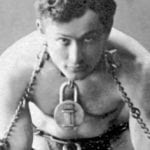 Our World
Our World  Our World
Our World  Pop Culture
Pop Culture 10 Incredible Female Comic Book Artists
 Crime
Crime 10 Terrifying Serial Killers from Centuries Ago
 Technology
Technology 10 Hilariously Over-Engineered Solutions to Simple Problems
 Miscellaneous
Miscellaneous 10 Ironic News Stories Straight out of an Alanis Morissette Song
 Politics
Politics 10 Lesser-Known Far-Right Groups of the 21st Century
 History
History Ten Revealing Facts about Daily Domestic Life in the Old West
 Weird Stuff
Weird Stuff 10 Everyday Products Surprisingly Made by Inmates
 Movies and TV
Movies and TV 10 Actors Dragged out of Retirement for One Key Role
 Creepy
Creepy 10 Lesser-Known Shapeshifter Legends from Around the World
 Our World
Our World 10 Science Facts That Will Change How You Look at the World
 Pop Culture
Pop Culture 10 Incredible Female Comic Book Artists
 Crime
Crime 10 Terrifying Serial Killers from Centuries Ago
Who's Behind Listverse?

Jamie Frater
Head Editor
Jamie founded Listverse due to an insatiable desire to share fascinating, obscure, and bizarre facts. He has been a guest speaker on numerous national radio and television stations and is a five time published author.
More About Us Technology
Technology 10 Hilariously Over-Engineered Solutions to Simple Problems
 Miscellaneous
Miscellaneous 10 Ironic News Stories Straight out of an Alanis Morissette Song
 Politics
Politics 10 Lesser-Known Far-Right Groups of the 21st Century
 History
History Ten Revealing Facts about Daily Domestic Life in the Old West
 Weird Stuff
Weird Stuff 10 Everyday Products Surprisingly Made by Inmates
 Movies and TV
Movies and TV 10 Actors Dragged out of Retirement for One Key Role
 Creepy
Creepy 10 Lesser-Known Shapeshifter Legends from Around the World
10 of the Most Absurd and Idiotic Deaths Ever Recorded
Most people will die under pretty mundane circumstances. But throughout history, there have been several unlucky individuals whose deaths can be described as more than simply noteworthy. While many have died heroic deaths over the centuries, this list is dedicated to those who died in amusing, ironic, and sometimes simply stupid ways.
Related: 10 Unfortunate Deaths Caused By Food
10 Matthew Webb

Professional swimmer Webb rose to fame by being the first man to swim the English Channel in 1875. After competing in several races and exhibitions in both the UK and USA, in 1882, Webb announced that he intended to swim across the rapids at the base of Niagara Falls.
Those who referred to the challenge as suicidal turned out not to be wrong. On July 24, 1883, wearing the same red trunks he wore when he completed the Channel swim, he jumped out of the side of a small ferryboat that he had rowed to mid-stream. Sadly, shortly after this, he was sucked into a whirlpool, and four days later, his body was found. His autopsy concluded that the large weight of the water temporarily paralyzed him, stopping him from breathing or using his limbs. Despite becoming a national icon for his achievements in swimming, his legacy stands in biting off more than he could chew with his final, near-impossible feat.[1]
9 Pausanias

No one screams brutality more than the Spartans. But their logic and strategies may be something to question. While best known for their attempt to defeat the Persians in the Battle of Thermopylae with a notoriously small number of soldiers, one Spartan general puts even this flawed thought process to shame.
Pausanias, who became the regent general after the death of his uncle King Leonidas in the above-mentioned battle, gained a reputation of being a tyrant and was quickly charged with conspiring with Persia against the Greeks. Despite twice being found innocent of treason, as rumors spread, eventually, it got to the point where Spartan authorities sent forces to arrest him. Pausanias thought that he could outsmart rather than outrun them. He fled to a temple of Athena, thinking that they wouldn’t attack him in a place so sacred. In that respect, he was right. Instead of entering the temple, the Spartans simply sealed up the entrance with Pausanias inside. According to legend, he was only removed once he was on the verge of death, having been starved. He died as soon as he was released.[2]
8 Gruffydd ap Llywelyn

Gruffydd ap Llywelyn didn’t exactly get dealt the best cards in life. Born the bastard child of Llywelyn the Great and his mistress, Gruffydd should have been entitled to anything any legitimate son would according to Welsh law. Unfortunately, because his father wanted to form an alliance with the English, Llywelyn agreed that when he married the King’s daughter that Gruffydd would be disinherited in favor of any of their future sons. Gruffydd was then put into the custody of King John.
This was only the first of three imprisonments Gruffydd had to endure. In 1223, years after being released from the English, Llywelyn feared that Gruffydd would dispute the inheritance of his first “legitimate” son Dafydd. Consequently, Gruffydd was held captive until 1234. His third and final capture was by Dafydd himself, who simply didn’t trust his brother and imprisoned both him and his son. It’s fair to say that by this point, Gruffydd was fed up. On Saint David’s Day in 1244, Gruffydd attempted to escape. Apparently, he did this by making a rope of sheets and attempting to climb down from his tower prison. Unsurprisingly, the rope broke, and he fell to his death.[3]
7 Draco

Draco is possibly the most notorious Greek lawmaker and ruler. Famous for his strict laws and brutal punishments, most crimes resulted in punishment by death. Although he was a ruthless leader, Draco was seemingly very popular. After his reign, though, he was exiled from Athens by its citizens. He spent the remainder of his life on the island of Aegina.
Despite being responsible for countless executions, his own death was rather comedic. According to several Greek historians, Draco died around 600 BC in the Aeginetan theatre. He supposedly took a standing ovation at the end of a speech. In a display of approval, the audience threw hats and other clothing at him—an odd but somewhat common occurrence in Ancient Greece. So many cloaks and hats were thrown over him that he ended up suffocating to death.[4]
6 Arthur Aston

Sir Arthur Aston was a Royalist general during the British Civil War. Shortly after becoming Governor of Oxford, on September 19, 1644, Aston was thrown from his horse and broke his leg. He developed gangrene and required amputation. The whole procedure was a success, and he continued on with a wooden prosthesis.
After the execution of King Charles I in 1649, Aston was left defending either Drogheda or Tredagh with 3,000 men against Cromwell’s army. This ultimately failed, and only about 30 people escaped. In a twisted state of cruel irony, Aston was beaten to death with his own wooden leg.[5]
5 Heraclitus

The death of Greek philosopher Heraclitus is without a doubt the most disgusting on the list. A famous and inspiring ancient philosopher, he influenced the likes of Plato and Aristotle. According to Diogenes Laertius, Heraclitus died in 745 BC, and the circumstances were nothing short of unusual.
Heraclitus developed dropsy, a condition that causes swelling due to fluid retention. He believed that if he stayed somewhere hot, the excess water would evaporate. Consequently, he buried himself in cow dung, but (shockingly!) this did not work. According to Laertius, Heraclitus was “unable to tear off the dung” and subsequently died.[6]
4 Clement Vallandigham

If ever there was a case that screamed irony, it’s the death of Clement Vallandigham. In Ohio in 1871, the lawyer was defending Thomas McGehan for the murder of Thomas Myers. A barroom brawl broke out the previous Christmas Eve, where it was known that Meyers and McGehan had a known disliking for each other.
The night following the prosecution’s argument, the lawyer conducted his own experiment with a pistol to establish the quantity of residue left by a gunshot at point-blank range. He was also given Myer’s gun as evidence, ready for examination. Vallandigham argued that, in the rush of the brawl, Myers had accidentally shot himself. During his demonstration—which happened in his hotel room in front of a witness—Vallandigham put a pistol in his pocket as Myers had, turned it toward himself, and pulled the trigger. What he hadn’t realized was that instead of using Myers’s unloaded gun, he had actually grabbed his own pistol, which still had bullets in it. Vallandigham accidentally shot and killed himself while trying to demonstrate that Myers had accidentally shot and killed himself.[7]
3 Sigurd the Mighty

There’s still plenty of questions surrounding Vikings among historians, but the reputation they have left among the general public is that of legendary groups of strong, brutal warriors constantly heading into battle. The death of Sigurd the Mighty could only ever happen to a Viking.
Sigurd was Earl of Orkney and, having formed an alliance with Thorstein the Red, began conquering parts of Scotland. This was the likely cause of a feud he had with a local magnate in Moray named Maelbrigte. After a battle between the two and their men, Maelbrigte was killed, and Sigurd attached the head of his enemy to his saddle. This gruesome symbol of victory was the demise of Sigurd, as he scratched his leg on the teeth of the corpse’s head as he rode his horse north. Rather anticlimactically, Sigurd the Mighty died of an infection caused by that scratch.[8]
2 Bobby Leach

Yet another man vs. Niagara Falls story. Bobby Leach was already an established stuntman when he decided to go over Niagara Falls in a barrel in 1911. He planned to be the second person and first man to do so—and at the age of 53. The first, of course, was Annie Edson Taylor in 1901, who afterward discouraged anyone else from attempting it.
Surprisingly, “Old Bobby” was successful! He did come out of it with a broken jaw and two broken kneecaps but told reporters that he was happy he’d achieved “the greatest ambition of his life.”’ With a life devoted to stunts and attempting a series of life-threatening performances, you may wonder what crazy story surrounded Leach’s death? In 1926 while in New Zealand, he slipped on an orange peel, and his broken leg developed gangrene. He passed away only a couple of days later. Not quite the wild ending to a rollercoaster life you expected.[9]
1 Franz Reichelt
Like most of those mentioned on this list, Reichelt had plenty of confidence in himself. An inventor and tailor, Reichelt created the parachute suit.
In February 1912, Reichelt tested the parachute suit by jumping off the Eiffel Tower. While authorities agreed for the suit to be tested using a mannequin, Reichelt decided to test his invention himself. Despite having police officers surrounding him, no one attempted to stop him. There was a cameraman on the first floor where Reichelt started and another on the ground with others who came to see the event. The suit was a complete failure. It didn’t slow the fall down, let alone allow him to fly, and there was nothing that could prevent his death at this point.[10]








